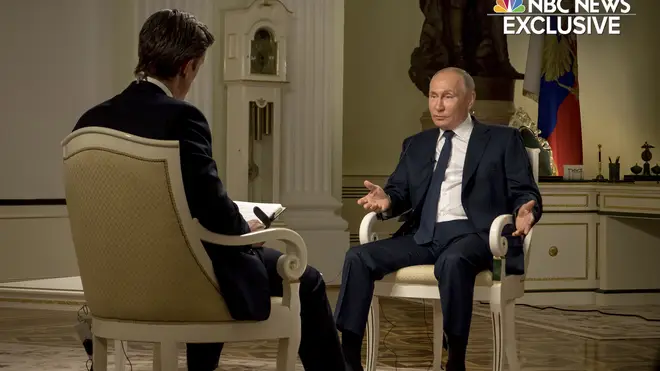
Simon Marks 4pm - 7pm
14 June 2021, 15:54

The Russian president also reiterated denials that the Kremlin was behind the poisoning of Alexei Navalny.
Russian President Vladimir Putin has suggested that the hundreds of people arrested for rioting at the US Capitol are being subjected to “persecution for political opinions”.
Mr Putin is likely to come under strong criticism from US President Joe Biden when they meet at a summit in Geneva on Wednesday for moves against his political opponents in Russia.
The imprisonment of opposition leader Alexei Navalny, detention of thousands of demonstrators protesting against his arrest, and outlawing of Mr Navalny’s organisations as extremist will be particular points of contention.

“You are presenting it as dissent and intolerance toward dissent in Russia. We view it completely differently,” Mr Putin said in an interview with NBC News. He then pointed to the January 6 unrest in Washington when protesters barged into the Capitol to try to halt the count of electoral votes to certify Mr Biden’s election victory over Donald Trump.
“Do you know that 450 individuals were arrested after entering the Congress? … They came there with political demands,” he said.
Mr Putin also reiterated denials that the Kremlin was behind last year’s poisoning of Mr Navalny with a nerve agent that nearly killed him.
“We don’t have this kind of habit, of assassinating anybody,” Mr Putin said.
“Did you order the assassination of the woman who walked into the Congress and who was shot and killed by a policeman?” Mr Putin said, referring to Trump supporter Ashli Babbitt, who was shot dead by a Capitol Police officer as she tried to climb through a window that led to the House floor.
Mr Putin also sharply dismissed allegations that Russia is carrying out cyberattacks against the United States as baseless.
“Where is the evidence? Where is proof? It’s becoming farcical,” Mr Putin said. “We have been accused of all kinds of things — election interference, cyberattacks and so on and so forth — and not once, not once, not one time, did they bother to produce any kind of evidence or proof, just unfounded accusations.”
In April, the United States announced the expulsion of 10 Russian diplomats and new sanctions connected to the so-called SolarWinds cyberattack in which several US government branches experienced data breaches. US officials blamed the Russian foreign intelligence service.
In May, Microsoft officials said the foreign intelligence service appeared to be linked to an attack on a company providing services to the US Agency for International Development.